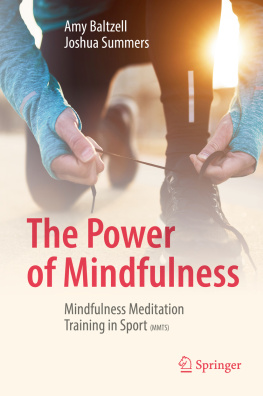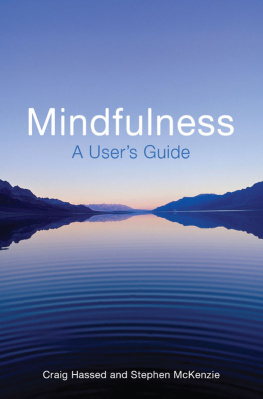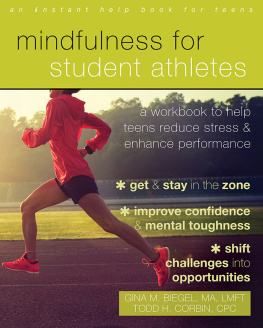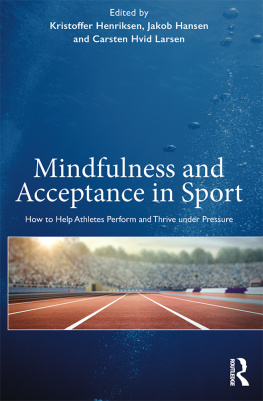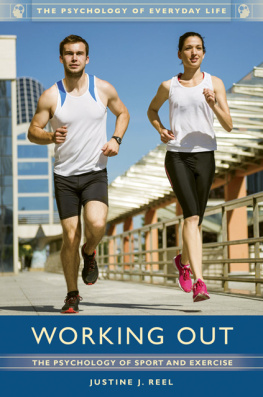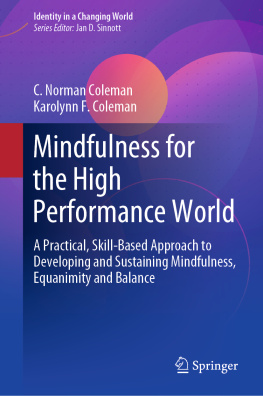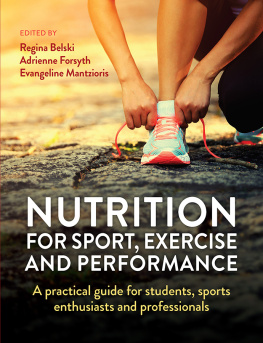Mindfulness is essentially awareness and acceptance of what is occurring. This simple idea has profound implications when you apply it to the sport and performance context. How could mindfulness education and training matter in sport? Arent you always aware? And isnt acceptance precisely what you do not want to do in performance? Doesnt acceptance lead to complacency and laziness? And how in the world would sitting down, meditating, help you score more baskets or run faster on the track? How could the practice of doing nothing and practicing not reacting help on the athletic field? These are all good questions and will be addressed throughout The Power of Mindfulness.
I (Amy) had similar initial reactions to the idea of mindfulness. I thought that the idea of meditating was interesting, but certainly not something I could do or would want to do. And yet over the past 10 years I have discovered that helping athletes cultivate a mindful approach is precisely what is sorely needed within the performance world. Over the past decade I have come to discover the power of being mindful: Learning to be more mindful yes, simply just noticing and accepting what is happening gives you the power to choose how you want to respond versus react. In fact, this simple idea of cultivating a mindful approach can have a profound impact on performance, such as empowering you to be:
More at choice in how you want to act versus being reactive (i.e., having a choice not to throw a racket or break a hockey stick in a moment of sport rage),
Better able to handle intense negative feelings like anxiety or fear,
Better able to focus and concentrate when feeling performance pressure, and
Better able to adapt and adjust within performance.
The use of mindfulness to become more present, balanced, and able to respond effectively to life challenges is not new. The concept of mindfulness is an essential element of Buddhist meditation training, which encompasses intentionally bringing awareness to the contents of the mind while practicing formal meditation. Cultivating mindfulness is also central to Jon Kabat-Zinns Mindfulness Based Stress Reduction program, the dominant mindfulness intervention across the western world and has been the forerunning intervention in mindfulness research. Mindfulness has been used in many psychologically based interventions and quite recently, over the past decade, the effort to help cultivate a mindfulness approach has made its way to sport and performance interventions.
What Is Mindfulness?
Mindfulness refers to being aware of whats happening in the present moment, which is a fundamental ability that we all share. If you are aware of these very words you are reading, the sensations of this book in your hands, or the sounds of a neighbors dog barking, then you are successfully using your innate capacity to be mindful. Mindfulness is not magical or mystical. It is the simple awareness of what is unfolding in real time, right now , just as it is. There is nothing more, nothing less.
While the ability to be mindful is a very natural function of the mind, wed like to address some of its key characteristics and functions that make it such a vital capacity for performing at your best. First well introduce three key characteristics of mindfulness:
Non-judgmental . Being mindful means being non-judgmental (or accepting to tolerating what has already happened). This means when you are mindful you are able to acknowledge just what is happening. You opt to acknowledge the reality before you take action. You may not prefer what is happening. You may prefer to go back to sleep versus get up at 6:00 am for the morning workout. But instead of chronically and reactively judging an experience as being good or bad, you are able to accept or tolerate that it is what it is for the moment. And with this skill of first noticing, you give yourself a bit of space to respond in a wise way versus reacting based on past experience. So, for example, when the athlete is woken up at 6:00 am for practice she can notice the tiredness, notice her aversion to getting up and then in a balanced way decide whether or not it is wise to get up or go back to sleep. Another example is rain. You may prefer that it never rains, but the fact is that sometimes it does rain, and even pours. So instead of judging that the rain is bad and getting caught up in irritation, it can be much more productive to simply notice the rain and perhaps notice irritation as well. And then with a mindfulness approach accept (or tolerate) the rain and the irritation in order to respond in a wise way, such as putting on a raincoat and carrying on with the day or opting to wait the rain out.
On the face of it, being non-judgmental might seem like a really odd quality to try and cultivate for athletes and performers, in general. After all, dont you want to judge how you are doing so you can improve and achieve more? The answer is a resounding, Yes! However, you must first be able to be mindful (aware of what is happening) before you move on to making wiser and better choices. First, you have to learn to be present to what is occurring: when you judge, you limit noticing all that may be happening in the moment. Once you can be fully present, then you can be more open, more creative, more proactive in competition and in training. Developing a non-judgmental attitude can be a radical shift in how athletes typically relate to competition. After all, you have been well trained to judge everything. You think about whether or not our last play was good or bad. You think about whether our workout is going well or poorly.
In short, you are always interpreting your experience in a self-focused way, based on what you want to happen or what you dont want to happen. Here, self-focused points to the psychological manner in which you habitually filter our present-moment experience through our self-oriented ideas about that experience. These ideas are conditioned by our past experiences. For example, imagine a game situation where an opponent on defense blocks your shot in basketball. As a result of this you might, in the moment, feel angry. Your self-image as a competent player is under threat. A self-focused response would be, Damn! I shouldnt have let that happen. What is wrong with me? Here, the mental reaction includes not only the initial anger at your shot being blocked, but also the subsequent reaction to this anger in the form of self-blame.
With mindfulness practice, you strengthen your awareness to recognize the presence of both what just happened (e.g., a shot being blocked) and the resulting emotions (e.g., anger), without judging them. Or more frequently, you might notice judging arising and learn to tolerate this normal occurrence. Another way of saying this is you can learn to tolerate what happens and your emotional responses. No one likes to get a shot blocked, and the shooter experiencing a reactive surge of anger is a typical response. But with a mindfulness practice you can learn to notice such patterns of emotional reaction and notice how your typical response might get in the way of performance. In such moments of noticing, you can learn to choose to respond differently (e.g., accept the rush of anger and still stay focused on the next play).

